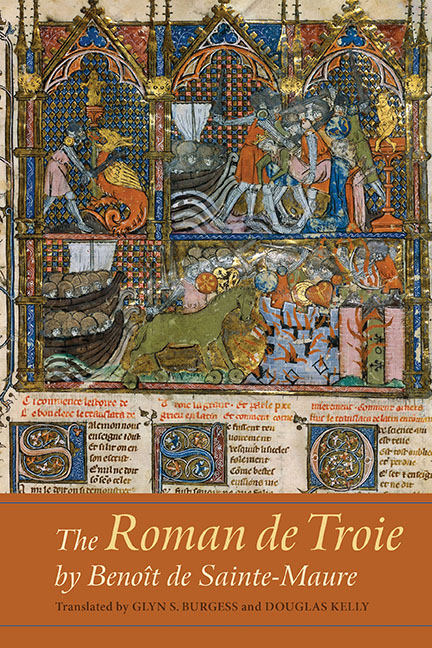Book contents
- Frontmatter
- Contents
- Dedication
- Preface and Acknowledgements
- Introduction
- A Note on the Translation
- Outline of the Roman de Troie
- The Roman De Troie
- Part One Causes and Effects
- Part Two The Trojan War
- Part Two The Trojan War
- Part Three Settling Scores and Surviving
- Appendix I Notes on Some Common Words in the Roman de Troie
- Appendix II Manuscripts of the Roman de Troie
- Bibliography
- Indexes of Personal and Geographical Names
- Index of Personal Names
- Index of Geographical Names
- Miscellaneous Endmatter
Part Two - The Trojan War
from Part Two - The Trojan War
Published online by Cambridge University Press: 15 February 2018
- Frontmatter
- Contents
- Dedication
- Preface and Acknowledgements
- Introduction
- A Note on the Translation
- Outline of the Roman de Troie
- The Roman De Troie
- Part One Causes and Effects
- Part Two The Trojan War
- Part Two The Trojan War
- Part Three Settling Scores and Surviving
- Appendix I Notes on Some Common Words in the Roman de Troie
- Appendix II Manuscripts of the Roman de Troie
- Bibliography
- Indexes of Personal and Geographical Names
- Index of Personal Names
- Index of Geographical Names
- Miscellaneous Endmatter
Summary
First Battle
The Greeks had planned for a long time and frequently prepared to go and lay siege to Troy by night, but they could not find the opportunity they wanted or the means to do so. They greatly feared how they would land there, for they could not avoid the need to go on board their ships in order to draw nearer to the city, nor was it easy for them to dock or to get on land in the face of men bent on defending it. They were uncertain as to how they would disembark, as they greatly feared misfortune. They had been perplexed about this for a long time, having taken and given much advice on the matter. One day the barons assembled for this purpose and discussed it. I cannot say or report in full what course of action each one recommended, but you can hear what Palamedes said about it in what follows. His words were well received, for everyone placed great trust in his intelligence. ‘My lords’, he said, ‘you can suffer great dishonour by this delay. A year, I believe, has passed since you arrived here, but you have not yet laid eyes on Troy. During this time a large number of troops have arrived there who will defend it against you with all their might and main. They have succeeded in constructing numerous palisades, barriers and ditches and have had ample time to reinforce them and to seek help. They think, apparently, that we do not dare advance. Do you presume to surprise them? It is no use thinking of doing that, for you will never besiege them until you have engaged them in combat. This is unavoidable, whatever may be the result. The longer you delay, the greater the harm you will incur. They feared you more before now than they will for a long time to come. Who advised you to allow them to feel confident, get reinforcements and seek aid? If the fleet had gone straight to the city, I am sure that there would have been no great opposition when we arrived. For that missed opportunity I know of no advice that I can offer. But on the morrow, without further delay, let us make our ships ready.
- Type
- Chapter
- Information
- The Roman de Troie by Benoît de Sainte-MaureA Translation, pp. 129 - 366Publisher: Boydell & BrewerPrint publication year: 2017

